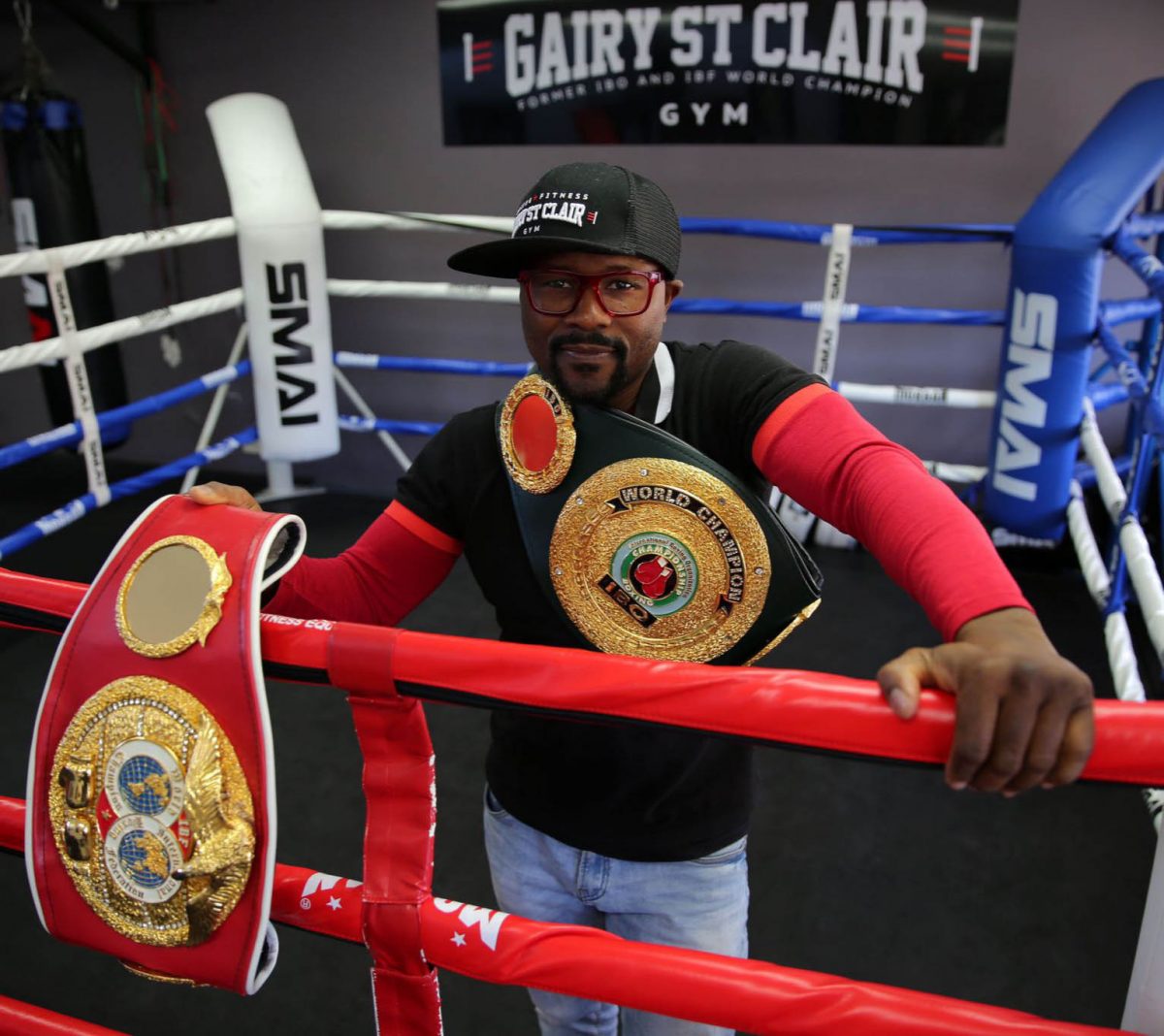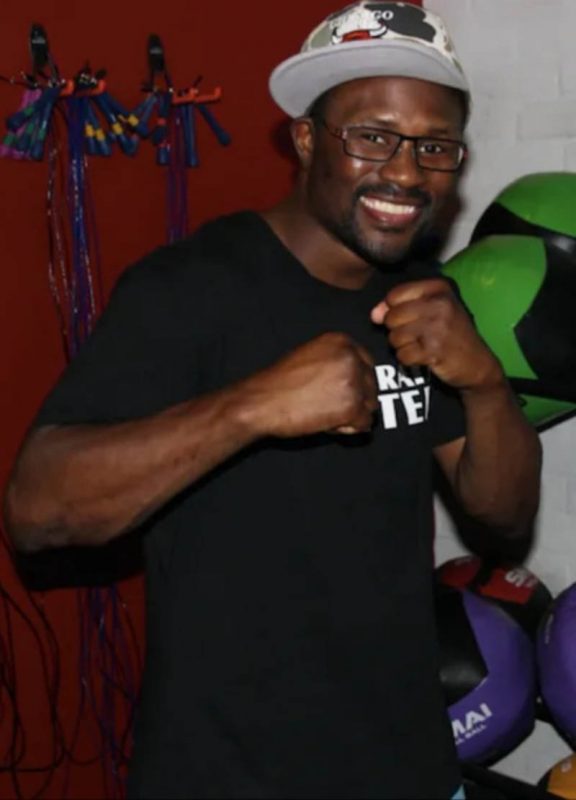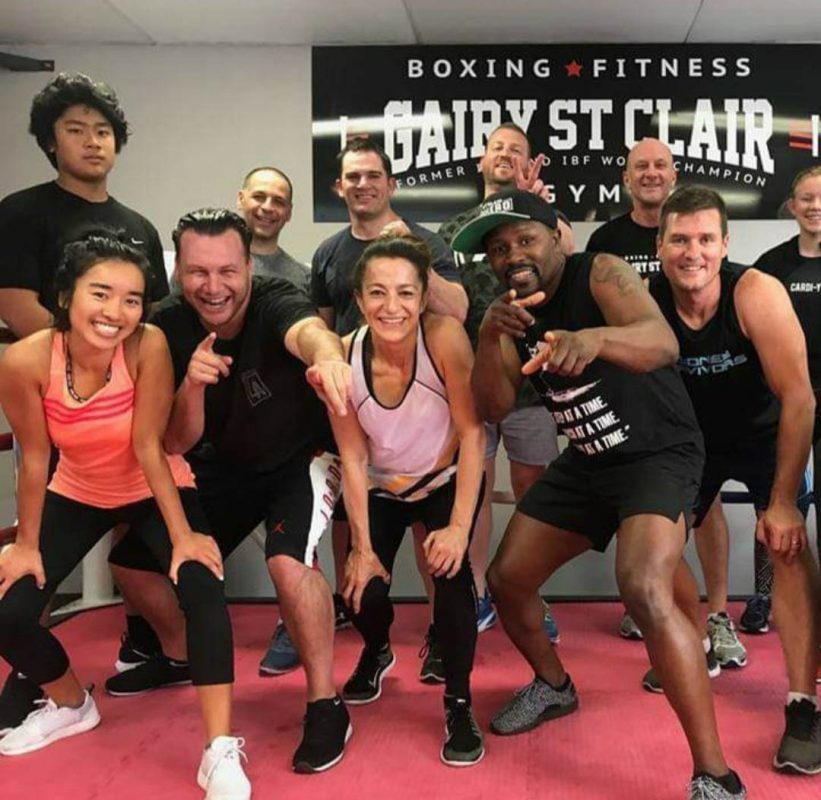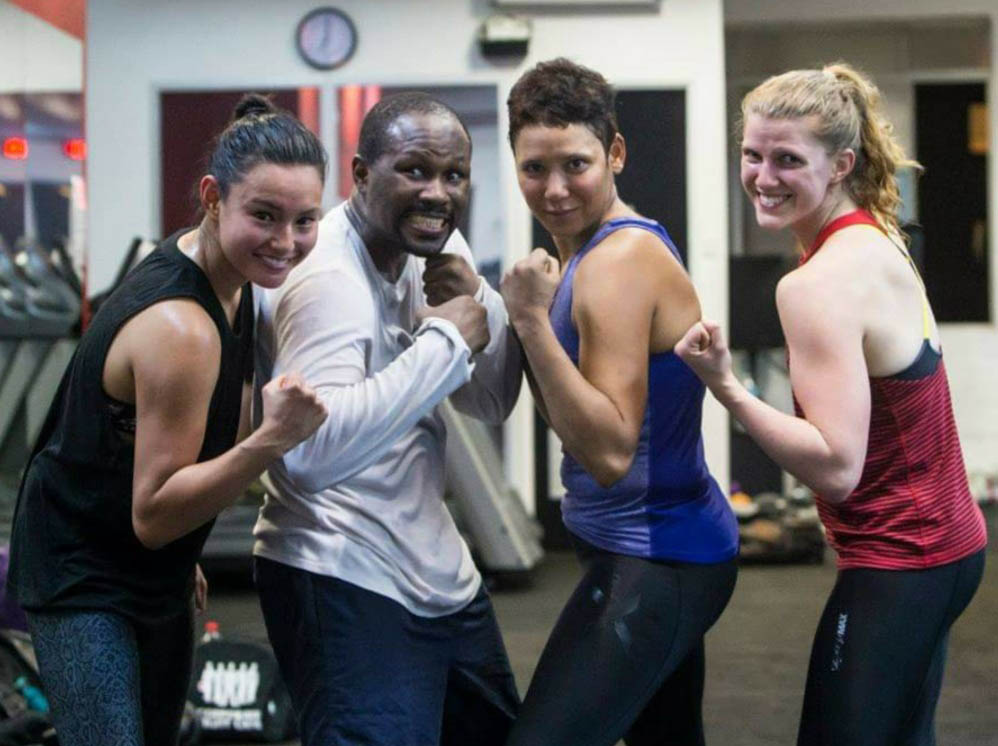In a little under two weeks, Gairy Sinclair, a Guyana-born boxing promoter and businessman, is to be inducted into the Australian Boxing Hall of Fame in Melbourne, Australia, where he now calls home.
“It is an honour. I don’t know how I got the nomination but I had 21 straight fights, straight wins and beating the best when I started living here,” says St Clair, 47, who became a former International Boxing Federation and International Boxing Organisation junior lightweight champion while not knowing how to read or write.
“I did a lot of community and charity work for children and other people because I am a living example of being helped when I begged for help or I wouldn’t be talking with you,” he told Stabroek Weekend.
In an interview from his home in the upscale Sutherland Shire, Sydney, Australia, St Clair said the first professional fights he promoted at Gairy St Clair’s Super Hero Fight Night on Wednesday in Western Sydney, was giving back to the sport and “Giving these guys a chance no one else would give them.”
The boxers he promoted were Syed Muhammad Asif, of Pakistan, who was fighting for the WBL Asia Pacific title, Stephan Da Silva, of Guyana, for the Interim Bantamweight WBL World title and Kaitlyn ‘Wild Thing’ Lodge, of Australia, who fought for the super welterweight WBL World Title.
Of his boxing career and his bumpy road to Australia, St Clair said his love for boxing started when he was about nine years while living at his grandparents’ house in East Ruimveldt, where he got into a lot of trouble for punching the flowers off plants.
He attended East La Penitence Primary and David Rose Community High schools, where, he said, “I didn’t learn crap. I basically floated through the schools in Guyana so I could not read or write. That presented a big struggle for me. I was boxing during my school years. It was the only thing I loved and the only thing I knew to do.”
St Clair’s uncle, Godfrey ‘Baffa’ Watson told him he could go far as a boxer and he believed him. “I started going to the Cliff Anderson Boxing Gym, trained under Cliff Anderson and, among others, Lennox Daniels, and one thing led to the next. From an early age I knew the only thing to take me out of Guyana and make me somebody of worth was boxing. I was right.”
To become a better boxer and a world champion, he knew he had to go to the USA. “I had no family members or close relatives to send for me. I knew no one in America but I knew how to fight and I fought my way. I represented Guyana in the Caribbean and at the Commonwealth Games. I won a gold medal for Guyana at the Pan American Games in Venezuela. I even went to Argentina to qualify for the 1992 Olympics in Barcelona but unfortunately the Guyana Government hadn’t enough money, so we took a bus to Buenos Aires from where we landed instead of a plane and the bus ride took almost a day. When we arrived in Buenos Aires, they told us one of our fighters, me, had already lost his match because the tournament had started the day before. It was a blow for me. I had dreamt of medalling at the Olympics and to move on from there. I didn’t want to wait for another four years for the Olympics so I went pro at 19 years. I had to eat and bills to pay.”
His first professional fight was in the super bantamweight and he fought five or six fights in Guyana and then went to New York, USA. He went to the US Embassy ten times to try to obtain a visa. “I was denied nine times but I was determined. On the tenth occasion I got a three-month visa. I was 21 years. My first fight in America was live. It was a Tuesday Night Fight, live on TV on the then USA Tuesday night fights. I was the first Guyanese fighter to fight another Guyanese, Forbes David, live on TV. I knocked him out in four rounds.”
When his three-month visa was up he returned to Guyana and went back to the US Embassy, which then granted him a five-year visa.
“I went back and forth. I was working and living in America on a visitor’s visa and no one told me I had to get a work visa. At the time I was young and living by my rules thinking I was earning the right way. I couldn’t read and write. I was lucky because a few times I stayed for 11 and 12 months when I only should have stayed for six months and they always let me back in the country. This one day in December 1999, the immigration officer told me, ‘Man you have been living in his country for the last how many years’. I denied it and he showed me my travel pattern. US immigration cancelled my visa and deported me to Guyana. I thought my life was over”
During his stay in the US one of his fights, which he lost, was before a crowd of 22,000 in neighbouring Canada. The loss was to Roberto Duran, who became the world’s lightweight champion.
Going Down Under
Back in Guyana, he was doing nothing. “I was begging this person for money and I couldn’t see him another day because I done beg him. But man, there is a God. One day I got a phone call from Boxu Potts in Trinidad and Tobago asking me if I wanted to go to Australia as a sparring partner for ‘Kostya’ Tszyu, a Russian Australian professional boxer who held multiple lightweight titles between 2001 and 2005. Potts managed Wayne ‘Big Truck’ Brathwaite, a former Guyanese world champion. I said ‘yes’ because I wanted to leave Guyana. I knew nothing about Australia except that they played cricket.”
He went to Australia in 2000 but it was not an easy route. In Trinidad, Potts helped him to get a United Kingdom visa.
“No one knew I could neither read nor write. I had this great skill of manipulating people into not letting them know that because I was ashamed.”
In London by himself and not knowing to read signs, he had to find the Australian embassy to get an Australian visa.
“I could talk. I asked people for help. I listened attentively and people showed me the train to catch and where to get off. I made it to the embassy where a woman was kind enough to help me do all my paper work. I knew how to sign my name. I got the visa immediately and so I came to Australia.”
St Clair boxed with Tszyu for six weeks as a south paw even though he was a right hander. “Kostya Tsyzu was to fight Zab Judah, an America south paw. “I would have fought backside, left side, right side, upside down, anything to get out of Guyana and I did it. Kostya was the best in the world, knocking everybody out and I sparred with him for six months left handed. He couldn’t hit me. He had knocked out four others from America before me but he couldn’t catch me. I was moving, ducking, rolling and even running.”
Then one day, St Clair said, “Kostya’s trainer, hall of famer, Johnny Lewis, said to me, ‘Son, you look good. I reckon you could become a world champion.’ I said, ‘Mhmm?’ He asked me, ‘Son do you want to come back and live in Australia.’ I said, ‘Hell, yes.’”
He returned to Guyana after the sparring stint then returned with his girlfriend to live in Australia in 2001. “But like I said, nothing was easy for me.”
Returning to Australia to live, he stopped in transit at John F Kennedy Airport, New York and ran into the same immigration officer who previously deported him along with a five-year ban. “He upgraded my ban to 20 years. Then they put me in handcuffs and had my feet in chains, the most embarrassing thing in my life. They walked me to the plane and everybody stared at me. When I got back to Guyana, they sent me to Eve Leary and the police released me after I said I was transiting to Australia.”
His Australian sponsors then bought him a ticket to transit through England and seven days later he was reunited with his girlfriend, who had continued to Australia by herself. “She was the reason I had to come.”
He then had 21 straight flights and won them all.
In 2006, he returned to Guyana to see his mother who was sick and who died the night after he had seen how happy she was to see him. “That was devastating. The same day after I had buried her I got a phone call telling me they got me the world title fight but I had to return to Australia right away. I flew back and I trained my butt off.”
He fought for the world title in Johannesburg, South Africa against South African Cassius Boloyi who had held the IBF and IBO titles for a while. “The night I fought for the world title, it didn’t matter who was in front of me. I had to win. I will never forget this, in the 12th round, Johnny Lewis said, ‘Son, you see that little light in the ceiling? That is your mom looking down on you.’ I got in the ring and man that was it. At the end of the fight, I heard what every fighter wants to hear, ‘and the new…’ (laughter). It was the most joyful and the happiest moment in my life. I had the Guyana flag on one leg and the Australian flag on the other as a sign of respect for the opportunity that country gave me. I wasn’t an Australian citizen.”
The fight in South Africa, St Clair said, was only for one reason. “They wanted me to lose, to get beaten because Boloyi was unbeaten. I had only one shot. There was no second chance. I did what I had to do.”
Biggest disappointment
After winning the world titles, St Clair and his girlfriend joined Lewis for coffee and biscuits then went to bed.
“There was no celebration. No one from Guyana telephoned to say congratulations or anything. If anyone had said, ‘I want you to come home,’ I would have jumped on a plane. I represented Guyana. My parents and grandparents are all Guyanese and to know where I born and grow, I wasn’t even recognised. Before winning the world titles I medalled and represented Guyana as best as I could. Listen, I love my country but it is a ruthless, disappointing place, man. I always thought that when I became world champion there was going to be a big change in my life. The biggest disappointment for me was never getting any recognition from the Guyana government after winning the world championships. They gave other boxers house and land. I got nothing.”
After winning the world titles, St Clair was given Australian citizenship and with it the benefits of becoming an Australian, including an Australian passport. “All I did was sign. They took me into this country and made me who I am. I get more love in this country than my own and they treat me like a god. In Guyana nobody gives a crap about me.”
His disappointment did not stop him from helping others in Guyana. “I helped other boxers to come to Australia. They find their feet and the majority migrate to America. I love my country Guyana. In Guyana you could have all the talent in the world but without the support it means crap. There are a lot of talented children in Guyana. The one that has support and looks good gets the chance. The one who is really good and has no support falls by the wayside. I was one without support but I refused to be, a wannabe. I begged and I borrowed so much I can’t even say who helped me. I think I begged everybody I knew in Guyana and that is why I never forget where I came from. I send stuff home for the guys at the gym, not for publicity but because I want to help.”
After winning the world titles, he married his girlfriend but the marriage lasted only four months. She went to the US and stayed there. “I was heartbroken,” he recalled. He eventually met someone else and that relationship ended after 15 years and three children. He has eight children.
After his first heartbreak, with no money and nothing going for him, St Clair found himself in the Australian social welfare system where apart from receiving handouts he was enrolled in a night school programme to learn to read, write and get other literacy skills. “It was hard at first but slowly I learned how to read and write at 25 years.”
After losing the IBF and IBO titles, he became depressed and started drinking. With encouragement from friends and reflecting on his life, he stopped and has not drank any alcohol for 15 years. “Since I stopped drinking my life has been better. I opened my own gym, Gairy St Clair Boxing Fitness Gym and I have been in business for the past six years.”








